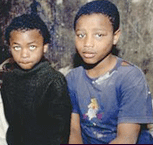| |
TB and Poverty Action Plan
Vision and Purpose Objectives Implementation of the action plan Activities
"A world where the poor and most vulnerable are protected from TB and have easy and equitable access to quality care"
Purpose:
To enable the STOP TB Partnership to achieve its global targets and contribute to its poverty related mission statements*:-
- To ensure that every TB suspect/patient has easy and equitable access to effective diagnosis, treatment and cure.
- To reduce the inequitable social and economic toll of TB.
Observable Verifiable Indicators (OVIs):**
- By 2010 all countries will:
- Have developed capacity to monitor the extent to which TB control reaches and serves the poor and vulnerable.
- Have developed key strategies for improving access to TB control for the poor and vulnerable.
- By 2015 all countries will have developed the capacity to demonstrate and monitor the contribution made by TB control to poverty alleviation.
Methods of verifying indicators (MVIs):
These indicators should be collected by the Partnership team that monitors progress towards achieving the Global Plan to Stop TB 2006-2015. A key activity of the TB & Poverty Subgroup is, in collaboration with the Stop TB Partnership Secretariat, to ensure that the information is collected, analysed and disseminated.
MVIs:***
- Number of countries measuring socioeconomic status to document equitable access to care.
- Number of countries that have an official pro-poor policy which includes TB.
- Number of countries that have implemented key strategies for improving access to TB care for the poor and vulnerable.
Advocacy:
| 1 |
To actively promote the explicit acceptance that diagnosis of smear positive TB disease is an international public good and should be provided free of charge for universal access in all health systems |
Focal Point: LSTM |
OVI: By the end of 2009 an inventory of all countries in which TB smear microscopy (or equivalent) is truly provided free of charge and description of other modalities of TB diagnosis provision.
MVI: Report published |
Update: A debate on free diagnosis (meaning any consultations and tests to ascertain the cause of a chronic cough and any other tests associated with a TB diagnosis) should be provided with no charge to patients) was held at the partners' forum in Rio and the participants voted in favour of free diagnosis. Two SMART recommendations were submitted and were incorporated into the overall Rio Recommendations.
A paper outlining this is currently under development |
| 2 |
To identify additional and feasible entry points for TB control interventions addressing prevention and specifically social determinants of TB |
Focal Point: WHO |
OVI: By the end of 2010 a systematic review on interventions addressing socioeconomic-related conditions, which can be potentially replicated in TB control, will be produced;
MVI: Report published |
| 3 |
To compile an inventory of information about the equity - enhancing effect of existing interventions (e.g. PPM, PAL and FIDELIS) |
Focal Point: LSTM |
OVI: By 2009, an inventory of at least five existing interventions produced
MVI: Report and summary on TB & Pov website |
Update: A systematic review which will identify the equity-enhacing effects of PPM is underway.
A report on FIDELIS is underway and we will find out (from KAren, for example) whether we can review this to draw out findings on equity.
The measurement of equity is being mainstreamed through TREAT TB impact assessment of Operational Research and other studies |
Research:
| 4 |
To develop a set of tools and indicators to be used in programme evaluation by NTPs to assess equity in access in relation to geographical, social/cultural, health system or economic barriers |
Focal Point: KNCV |
OVI: Number of tools and indicators developed.
OVI2: Number of countries that have implemented any of the tools and indicators.
MVI: information on tools and indicators is shared in TB & Poverty Subgroup meetings & conference calls. The Subgroup Secretariat collects the information and communicates new developments to the Stop TB Partnership Secretariat. |
Update: The Tool to Estimate Patients' Costs was developed, piloted in Kenya and is currently implemented in three countries (Ghana, Viet Nam, Dom Rep). It was also used in Myanmar related to a Master Thesis. The tool will be presented at several meetings/conferences in 2009/2010 where it is hoped that more NTPs will be interested to implement it.
(Following the pilot, the Kenya NTP has established a TB&Poverty working group with technical assistance support from KNCV. The objective of the WG is to improve access to TB care within the TB program with a set of interventions, based on several studies conducted in the last years dealing with access, patients' cost and health seeking behaviour. In addition, the WG will establish links with other entities, organizations and programs which work in poverty reduction and housing.)
TB CAP has developed a patient package for patient centered approach including the patient cost tool, the Quote Tool (to evaluate quality of TB services) and the patient charter. The package will be presented and disseminated at various conferences and meetings.
Together with the Union, KNCV is organizing a PGC in Cancun on the TB and Poverty Guide. Various members of the sub-working group have been approached to facilitate this course.
|
| 5 |
To develop standard indicators , measurement strategies and targets to monitor and evaluate the impact of new tools for the diagnosis and treatment of poor patients with symptoms suggestive of all forms of TB |
Focal Point: FIND |
OVI:
To produce a concept note defining the indicators collected, the measurement strategy and the targets to monitor and evaluate the impact of new tools for the diagnosis of TB and MDR TB
To pilot at least one-site study by the end of 2010
MVI: Report published and guidelines for NTP produced |
Support:
| 6 |
To document and facilitate the development of pro-poor health system interventions that recognise the specific barriers faced by the poor and other vulnerable groups such as those indigenous or migrant people, prisoners or those with TB/HIV and MDR - TB |
Focal Point: AFN |
OVI:
A Global Indigenous STOP TB Plan developed and agreed to by indigenous groups
A secretariat representing the needs of indigenous people functioning within the STOP TB Partnership
MVI: Plan and secretariat minutes produced |
Update: A decision has been made not to search for funding for a unique secretariat but rather to develop a position for a dedicated focal point person that woud be housed in one of the partners to the Stop TB Partnership that would implement the Strategic and Action Plan developed at the Toronto meeting in November, 2008.
A global indigenous STOP TB strategy has been developed and agreed by indigenous groups and is supported by the UN Permanent Forum on Indigenous Issues. |
Support:
| 7 |
To develop methods for building country capacity and technical assistance for the implementation and evaluation of pro-poor strategies described in the "Addressing Poverty in TB Control: Options for NTPs". |
Focal Point: Union |
OVI:
1 survey undertaken to assess necessary capacity and acceptable methods for assisting countries to meet 2015 OVIs
3 NTPs implementing options from TB and Poverty Guide and evaluating according to agreed criteria
Training materials developed for NTPs and technical assistance consultants
Database of more than 10 consultants competent in advising NTPs on TB and Poverty
MVI: Published survey and training materials produced. |
Role and Responsibility of the TB & Poverty Subgroup in relation to the other Working Groups and Partners of the STOP-TB Partnership in delivering the Action Plan
The prime role of the Subgroup is in promoting and stimulating pro-poor TB control. The Subgroup cannot itself be responsible for implementation on the ground. This is the province of the Implementation Working Groups and TB programmes at country level and beyond. The TB & Poverty Subgroup will use its network of individuals and organisations who also have roles in all the other Working Groups of the Partnership and within implementing bodies to promote activity on the ground.
Different organisations currently active in the TB & Poverty Sub-group have participated over the past year in developing this Action Plan. Each objective has a focal point who collates the results of the activities of the objective. The agreed principles for further development of the activity plans for each output are:
- That developing country organisations must play a prominent role.
- That more detailed activity plans will be reviewed and modified by the TB & Poverty Core Team supported by external independent reviewers
Broad activity descriptions have been grouped according to outputs, mapped to the responsible agencies within the TB & Poverty Sub-Group,
More detail is given about the early outputs and activities which are deliverable within the first 2 years of the action plan.
Click here for the list of activities.
* - As stated in the STOP TB Partnership Mission statement: stoptb.org/stop_tb_initiative/#vmg
** - As stated in the Global Plan: /globalplan/assets/documents/SSP_DEWG.pdf
*** - the indicators given in the WHO Compendium of Indicators
**** - Change to objectives from outputs to be in line with the other working groups

|
|






